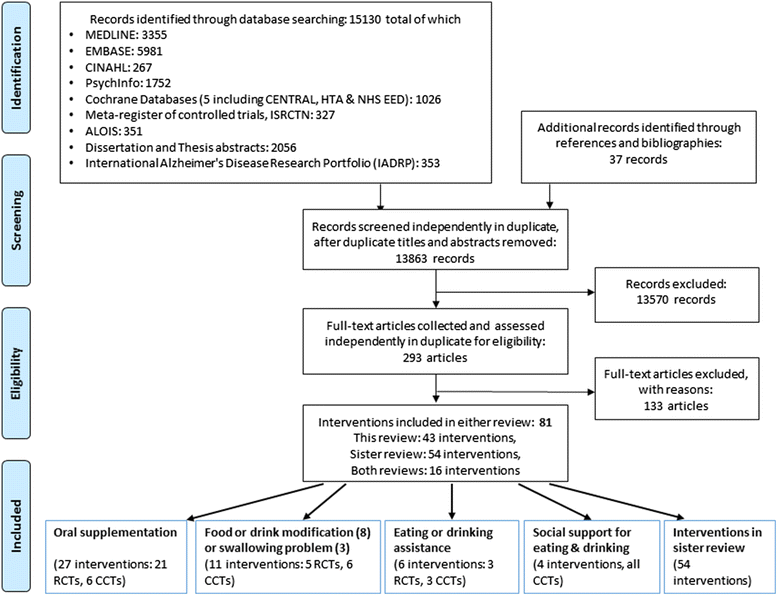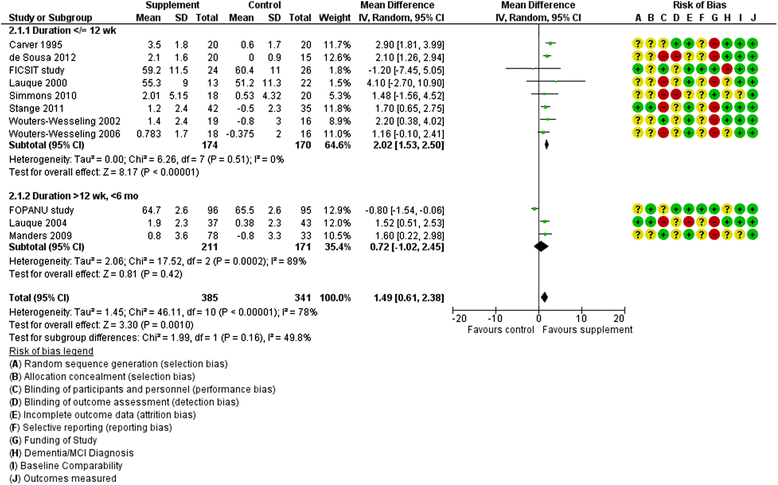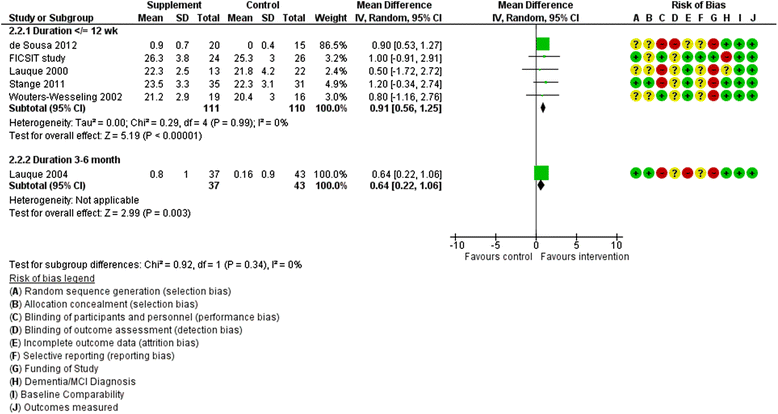Effectiveness of interventions to directly support food and drink intake in people with dementia: systematic review and meta-analysis
- PMID: 26801619
- PMCID: PMC4722767
- DOI: 10.1186/s12877-016-0196-3
Effectiveness of interventions to directly support food and drink intake in people with dementia: systematic review and meta-analysis
Abstract
Background: Eating and drinking difficulties are recognised sources of ill health in people with dementia. In the EDWINA (Eating and Drinking Well IN dementiA) systematic review we aimed to assess effectiveness of interventions to directly improve, maintain or facilitate oral food and drink intake, nutrition and hydration status, in people with cognitive impairment or dementia (across all settings, levels of care and support, types and degrees of dementia). Interventions included oral nutrition supplementation, food modification, dysphagia management, eating assistance and supporting the social element of eating and drinking.
Methods: We comprehensively searched 13 databases for relevant intervention studies. The review was conducted with service user input in accordance with Cochrane Collaboration's guidelines. We duplicated assessment of inclusion, data extraction, and validity assessment, tabulating data, carrying out random effects meta-analysis and narrative synthesis.
Results: Forty-three controlled interventions were included, disappointingly none were judged at low risk of bias. Oral nutritional supplementation studies suggested small positive short term but unclear long term effects on nutritional status. Food modification or dysphagia management studies were smaller and of low quality, providing little evidence of an improved nutritional status. Eating assistance studies provided inconsistent evidence, but studies with a strong social element around eating/drinking, although small and of low quality provided consistent suggestion of improvements in aspects of quality of life. There were few data to address stakeholders' questions.
Conclusions: We found no definitive evidence on effectiveness, or lack of effectiveness, of specific interventions but studies were small and short term. People with cognitive impairment and their carers have to tackle eating problems despite this lack of evidence, so promising interventions are listed. The need remains for high quality trials tailored for people with cognitive impairment assessing robust outcomes.
Systematic review registration: The systematic review protocol was registered (CRD42014007611) and is published, with the full MEDLINE search strategy, on Prospero.
Figures



Similar articles
-
Effectiveness of interventions to indirectly support food and drink intake in people with dementia: Eating and Drinking Well IN dementiA (EDWINA) systematic review.BMC Geriatr. 2016 May 4;16:89. doi: 10.1186/s12877-016-0256-8. BMC Geriatr. 2016. PMID: 27142469 Free PMC article.
-
Modifying the consistency of food and fluids for swallowing difficulties in dementia.Cochrane Database Syst Rev. 2018 Sep 24;9(9):CD011077. doi: 10.1002/14651858.CD011077.pub2. Cochrane Database Syst Rev. 2018. PMID: 30251253 Free PMC article.
-
Enteral tube feeding for people with severe dementia.Cochrane Database Syst Rev. 2021 Aug 13;8(8):CD013503. doi: 10.1002/14651858.CD013503.pub2. Cochrane Database Syst Rev. 2021. PMID: 34387363 Free PMC article.
-
Nutritional interventions for survivors of childhood cancer.Cochrane Database Syst Rev. 2016 Aug 22;2016(8):CD009678. doi: 10.1002/14651858.CD009678.pub2. Cochrane Database Syst Rev. 2016. PMID: 27545902 Free PMC article.
-
Reminiscence therapy for dementia.Cochrane Database Syst Rev. 2018 Mar 1;3(3):CD001120. doi: 10.1002/14651858.CD001120.pub3. Cochrane Database Syst Rev. 2018. PMID: 29493789 Free PMC article.
Cited by
-
Fingerfoods: a feasibility study to enhance fruit and vegetable consumption in Dutch patients with dementia in a nursing home.BMC Geriatr. 2020 Oct 23;20(1):423. doi: 10.1186/s12877-020-01792-5. BMC Geriatr. 2020. PMID: 33096998 Free PMC article.
-
Factors influencing the pace of food intake for nursing home residents with dementia: Resident characteristics, staff mealtime assistance and environmental stimulation.Nurs Open. 2019 Mar 6;6(3):772-782. doi: 10.1002/nop2.250. eCollection 2019 Jul. Nurs Open. 2019. PMID: 31367399 Free PMC article.
-
Effects of Hand Exercise on Eating Action in Patients With Alzheimer's Disease.Am J Alzheimers Dis Other Demen. 2019 Feb;34(1):57-62. doi: 10.1177/1533317518803722. Epub 2018 Oct 9. Am J Alzheimers Dis Other Demen. 2019. PMID: 30301358 Free PMC article. Clinical Trial.
-
Development and Inter-Rater Reliability of the Mealtime Scan for Long-Term Care.Gerontologist. 2018 May 8;58(3):e160-e167. doi: 10.1093/geront/gnw264. Gerontologist. 2018. PMID: 28329849 Free PMC article.
-
Nutritional supplements for neuropsychiatric symptoms in people with dementia: A systematic review and meta-analysis.Int J Geriatr Psychiatry. 2020 Nov;35(11):1285-1291. doi: 10.1002/gps.5407. Epub 2020 Aug 28. Int J Geriatr Psychiatry. 2020. PMID: 32805754 Free PMC article.
References
-
- Abdelhamid A, Bunn D, Dickinson A, Killett A, Poland F, Potter J et al.: Effectiveness of interventions to improve, maintain or faciltate oral food and/or drink intake in people with dementia. PROSPERO 2014, CRD42014007611: http://www.crd.york.ac.uk/PROSPERO/display_record.asp?ID=CRD42014007611 .
-
- World Health Organization: Dementia: Fact sheet N°362. accessed 25 08 2015: http://www.who.int/mediacentre/factsheets/fs362/en/; 2015.
-
- Alzheimer’s Disease International: World Alzheimer Report 2009: The Global Prevalence of Dementia. accessed 25 08 2015: http://www.alz.co.uk/research/world-report-2009; 2015.
Publication types
MeSH terms
Grants and funding
LinkOut - more resources
Full Text Sources
Other Literature Sources
Medical

